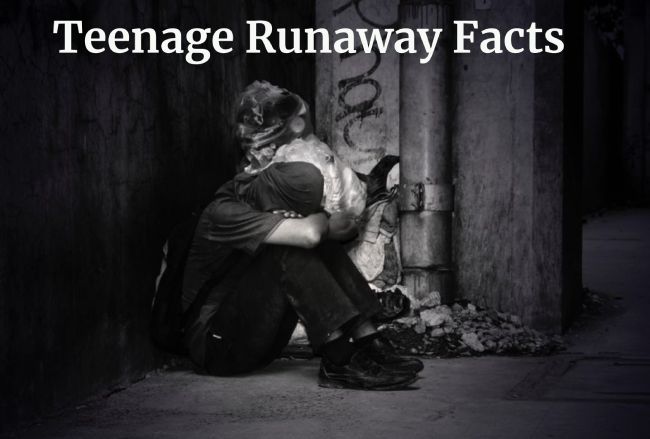Homelessness is never a goal of a teenager, running from the very people who were supposed to care for and protect him. In spite of this, between 1.6 and 2.8 million teens run away from home each year, according to the National Runaway Switchboard. Sexually, physically, and emotionally abused teenagers are common.
Instead of finding safety, they end up running right into a snare of dangerous predators looking for vulnerable youth who only want to be cared for.
Causes for Running Away from Home
- Almost half of teen runaways reported having a conflict with a parent or guardian.
- The majority of teens reported that their parents kicked them out or didn’t care if they left.
- Before running away, 80% of youth reported sexual or physical abuse.
Mental Illness
Depression: Teenagers who become depressed may have difficulty making decisions and may act impulsively. Teenagers who suffer from depression may blame their parents for their problems since they do not understand their emotions and thoughts. As a result, they mistakenly believe being away from them will solve all of their problems.
Conduct disorder, also known as oppositional defiant disorder, is another mental disorder often experienced by teen runaways. People with this disorder have a difficult time obeying authority and will act out in retaliation if they are told what to do. Impulsive and sometimes threatening, their actions are impulsive. They run away because they don’t want to follow anyone else’s rules but their own.
Substance Abuse
According to the website, TroubledTeenSearch.com, 71% of surveyed street youths in Los Angeles abused drugs and/or alcohol. These substances act on the mind very much like mental illess, leading to impulsivity and poor judgment skills. Not only does this lead many teenagers to run away, but it also propels them into a life of drugs, alcohol, crime and abuse on the streets.
Difficulties in Adolescence
Adolescents have a difficult time expressing their thoughts and emotions at times. This can cause them to feel powerless. To gain back that control, they feel as though they need to break away from the chains of parents and authority. They feel that if they can make it on their own, they will be able to show everyone how much they really know.
Adolescents who run away from home are usually running away from something they can’t face. This could be parental separation, sexual orientation, bullying in school and other traumatic events. Teenagers don’t runaway for attention but to escape the realities of a world they are afraid of or exhausted from living in. They want to be free from the devastation and find a new happiness.
Life on the Streets
Most runaways return home within 48 hours to a week and will typically stay with friends, according to the National Runaway Switchboard. However, the longer teenagers stay away from home, the higher the risk they have of becoming victims of perpetrators (abuse and assault). Involvement in gangs, illegal activities, and suicide are all possible results of homelessness.
Teen Runaway Help
If you are a runaway, you don’t have to run anymore. You can get help. Call 1-800-RUNAWAY. They have people who will help you find shelters and the assistance you need to make it back on the right path, even if that isn’t home for you.
If you do want to go home but have no idea how to get there from where you are or just don’t have the money, National Runaway Switchboard has a program that will help you get home on Greyhound bus lines free. Simply call their number for help.

Parent Tips for Dealing with a Runaway Situation
If you suspect your teenager has run away, follow these steps:
- Call his friends to ask about the last time they saw him.
- Visit local hangouts or possible places he may have gone.
- Check her room and belongings to find any clues of her whereabouts.
- Call the police to report a missing person.
- Acquire caller ID in case your teenager calls.
- Call area shelters to check to see if he has contacted them and ask for further information on who to call.
- Call 1-800-RUNAWAY for even more information on your plan of action.
If Your Teen Calls
Remain as calm as possible if your teenager calls. Show that you are genuinely concerned and care for her. Urge her to come home, but listen as well. Many teens just want the chance to be heard.
Refrain from saying anything negative to your teen, for example, “When you get home, you’re going to be grounded.” Take this running away as a serious sign that something is wrong and that your son or daughter needs help.
When Your Teen Comes Home
It’s a very emotional and sensitive time when a runaway comes home. He feels apprehensive about walking in the door because he doesn’t know what to expect. Understand that this was as traumatic for him as it has been for you. Take this time to show your teenager that you are willing to work through any of the difficulties he is having and that you accept his return with open arms. The following are some other tips:
- Listen to your teen and take down any help that he may need since his absence such as medical attention and/or counseling.
- Call all the people you contacted about his disappearance to let them know he is home.
- Make a conscious effort to show how appreciative you are to have him home, that you love him and want to care for him as he wants to be cared for.
- If your teenager is defiant, contact your local help line.
